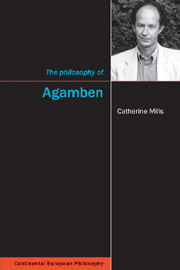Book contents
- Frontmatter
- Contents
- Acknowledgements
- Abbreviations
- Introduction
- 1 Metaphysics: negativity, potentiality and death
- 2 Aesthetics: language, representation and the object
- 3 Politics: biopolitics, sovereignty and nihilism
- 4 Ethics: testimony, responsibility and the witness
- 5 Messianism: time, happiness and completed humanity
- Conclusion
- Notes
- Chronology of major works
- Bibliography
- Index
2 - Aesthetics: language, representation and the object
- Frontmatter
- Contents
- Acknowledgements
- Abbreviations
- Introduction
- 1 Metaphysics: negativity, potentiality and death
- 2 Aesthetics: language, representation and the object
- 3 Politics: biopolitics, sovereignty and nihilism
- 4 Ethics: testimony, responsibility and the witness
- 5 Messianism: time, happiness and completed humanity
- Conclusion
- Notes
- Chronology of major works
- Bibliography
- Index
Summary
Agamben indicates in the 1989 preface to the English translation of Infancy and History that the key question that unites his work is what it means for language to exist, what it means that “I speak”. In taking up this question throughout his work, and most explicitly in texts such as Infancy and History, Language and Death and The Open, Agamben reinvigorates consideration of philosophical anthropology through a critical questioning of the metaphysical presuppositions that inform it and, in particular, the claim that the defining essence of man is that of having language. In taking up this question, Agamben proposes the necessity of an experimentum linguae that allows a new experience of language. As discussed in Chapter 1, this new experience of language is encapsulated in the notion of infancy, which can be understood as a condition that makes speech possible while also being expropriated or set aside in speech. Importantly, this idea of infancy is posed as a way of moving out of the metaphysical presupposition of a negativity inherent to language (which Agamben delineates in the idea of Voice) and, by virtue of that, also inherent to the ethos of humanity.
These reflections on metaphysics and the negative ground of language in Voice yield several interrelated avenues for further investigation for Agamben. One of these is to consider the different understandings of language at work in both prose writing and poetry.
- Type
- Chapter
- Information
- The Philosophy of Agamben , pp. 35 - 58Publisher: Acumen PublishingPrint publication year: 2008



